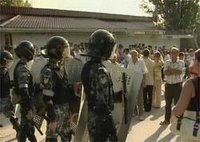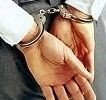ETHNIC CLASHES IN CRIMEA

The Crimea has never been so close to war as this past weekend when Crimean Tatars clashed with Slavic population in the city of Bakhchisaray. The two year conflict over the Central market erupted into a fierce battle between Tatar radicals and Russian speaking merchants. Two years ago, the illegal Tatar parliament the “Medjlis” decided that the Central market in Bakhchisaray, former capital of the medieval Crimean Khanate, is overlapping an old cemetery. The Medjlis demanded that the market be moved to another location because cemeteries are sacred to Tatars. The Tatar activists produced no proof to substantiate their claims. It caused suspicion that the Medjlis wanted to get the land the market is located on for its own commercial purposes. The Crimea is full of so called “glades of protests”, plots of land seized by Tatars in the most scenic areas. They stake out a claim to many plots throughout the peninsula saying that all the Crimea is their ancestral territory and implying that all other nationalities should leave.
Merchants in Bakhchisaray refuse to move to another location. For many of them their business in the Central market is the only source of income. Saturday, the Russian Community of the Crimea staged a rally near the market demanding that the Medjlis militants lift the blockade and let the merchants to resume their usual trade activity. The militants responded by stones, abuse and attacks. Police say the clashes that flared up involved 300 participants from each side. The authorities took the side of the Tatars as they usually did in the past following their “divide and rule” policies in the Crimea. Ukrainian regime apparently thinks that by pitting Tatars against the Slavic majority they will manage to keep the Crimea under their control. However, such policy does not seem to be working now. As the leader of the Crimean youth organization “The Proryv” points out, the war in the peninsula seems to be imminent. The situation is degenerating. “For three years we have been saying that their will be a war in the Crimea, Mr. Alexei Dobychin said. The situation is out of control”. Alexey Dobychin blames the inept Ukrainian regime and its Russophobia for failing to foresee that the war was looming.
The situation in Bakhchisaray is remaining very tense.


